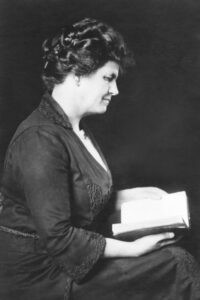
The City of Fire
Sabbath Valley lay as a green jewel cupped in the hand of the surrounding mountains with the morning sun serene upon it picking out the clean smooth streets, the white houses with their green blinds, the maples with their clear-cut leaves, the cozy brick school house wide-winged and friendly, the vine-clad stone church, and the little stone bungalow with low spreading roof that was the parsonage. The word manse had not yet reached the atmosphere. There were no affectations in Sabbath Valley.
Billy Gaston, two miles away and a few degrees up the mountainside, standing on the little station platform at Pleasant View, waiting for the morning train looked down upon the beauty at his feet and felt its loveliness blindly. A passing thrill of wonder and devotion fled through his fourteen-year-old soul as he regarded it idly. Down there was home and all his interests and loyalty. His eyes dwelt affectionately on the pointing spire and bell tower. He loved those bells, and the one who played them, and under their swelling tones had been awakened new thoughts and lofty purposes. He knew they were lofty. He was not yet altogether sure that they were his, but they were there in his mind for him to think about, and there was a strange awesome lure about their contemplation.
Down the platform was the new freight agent, a thickset, rubber-shod individual with a projecting lower jaw and a lowering countenance. He had lately arrived to assist the regular station agent, who lived in a bit of a shack up the mountain and was a thin sallow creature with sad eyes and no muscles. Pleasant View was absolutely what it stated, a pleasant view and nothing else. The station was a well-weathered box that blended into the mountainside unnoticeably and did not spoil the view. The agent’s cabin was hidden by the trees and did not count. But Pleasant View was important as a station because it stood at the intersection of two lines of thread-like tracks that slipped among the mountains in different directions; one winding among the trees and about a clear mountain lake, carried guests for the summer too and fro, and great quantities of baggage and freight from afar; the other traveled through long tunnels to the world beyond and linked great cities like jewels on a chain. There were heavy bales and boxes and many trunks to be shifted and it was obvious that the sallow station agent could not do it all. The heavy one had been sent to help him through the rush season.
Read or download Book
Grace Livingston Hill
Grace Livingston Hill was born in Wellsville, New York to Marcia Macdonald Livingston and her husband, Presbyterian minister, Rev. Charles Montgomery Livingston. Both were writers, as was her aunt, Isabella Macdonald Alden, who wrote under the pseudonym “Pansy.” Hill’s writing career began as a child in the 1870s, writing short stories for her aunt’s weekly children’s publication, The Pansy.
Her first story printed in book form was The Esselstynes, which was published in 1877 as part of the “Mother’s Boys and Girls Library” by D. Lothrop & Company. A Chautauqua Idyl, her first book as a young adult, was written in 1887 to earn enough money for a family trip from her Florida home to the summer Chautauqua gathering at Chautauqua, New York. This illustrated allegory of a Chautauqua gathering held by the flowers, trees, and animals was published in time to be offered for sale that summer and brought enough earnings to take the family there. Several books written in collaboration with her family followed in the early 1890s, as well as her only children’s book, A Little Servant. Lack of funds was a frequent motivator, particularly after the death of her first husband left her with two small children and no income other than that from her writing. After the death of Hill’s father less than a year later, her mother came to live with her. This prompted Hill to write more frequently.
Biography.
During and after her failed ten-year marriage to her second husband Flavius Josephus Lutz, a church organist 15 years her junior, she continued to write to support her children and mother. She stopped using the Lutz surname after they parted ways in May 1914. Although many of her earlier novels were specifically intended to proselytize, Hill’s publishers frequently removed overt references to religious themes. After her publishers realized the popularity of her books, references to religious topics were allowed to remain, although she later modified her writing style to appeal to a more secular audience.
The last Grace Livingston Hill book, Mary Arden, was finished by her daughter, Ruth Hill Munce, writing under the name of Ruth Livingston Hill, and published in 1948.






